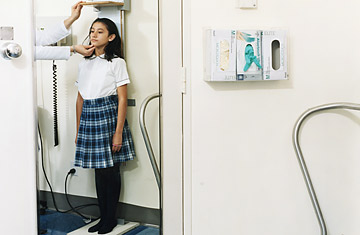
Growth spurts are good — unless they happen too fast and too soon. Then they could suggest premature puberty
(3 of 7)
There is no shortage of theories about what's causing this to happen so early. Obesity, a well-established puberty accelerant, is high on the list of suspects. A third of all American kids are overweight or obese, and in the 6-to-11 age group, the rate of obesity went from 7% in 1980 to 20% in 2008. Weight may also help explain the racial differences in puberty studies. Income disparity generally means dietary disparity, with richer people in the West eating leaner, healthier foods. Data from China and India similarly indicate that race by itself isn't a factor but general prosperity is. Onset of puberty is on a downward march in those countries too, likely because of their increasing wealth and heartier--often fattier--diets.
But even in Europe, where the standard of living has been high for decades and diets haven't changed much, something strange is going on. A study of girls conducted in Denmark in 2008 found that the average age of breast development there is 8.86 years, which may be a bit later than it is for American girls but is a full year earlier than it was for Danes as recently as 1993. "For me," says Dr. Paul Kaplowitz, chief of endocrinology at Children's National Medical Center in Washington, "the aha moment was the Danish study."
If it's not just diet, what else could be causing this change? Some investigators are focusing on environmental contaminants like PBBs and, more notoriously, bisphenol A (BPA) and phthalates, common ingredients in plastic products that have endocrine-disrupting powers of their own. Hormones used to fatten cattle and poultry may play a role as well. But so may seemingly innocent foods like soy, which includes isoflavones that mimic the behavior of estrogen. Certain components in lavender and tea-tree oils may also have estrogenic properties, as do estrogen and testosterone creams, which may be prescribed to parents but wind up in the hands of kids. Even TV and the Internet may play a role, since they foster inactivity, which exacerbates obesity.
In a few cases, the answer is straightforward. Cysts on the pituitary or ovaries can cause premature release of hormones. A condition known as McCune-Albright syndrome, caused by a mutation in a gene that signals endocrine cells, can lead to a suite of symptoms including precocious puberty. An enzyme malfunction that causes overproduction of androgens by the adrenal glands can also result in precocious puberty in boys.
As serious as conditions like these can be, they're diagnostically satisfying--if only because doctors and patients know what they're up against and how to treat it. But such clarity is rare. At a maximum, only about 20% of cases of early-onset puberty have a readily identifiable clinical cause--and even that applies mostly to the youngest patients. One French study showed that in girls whose precocious puberty began after age 6, just 2% had some kind of anomaly that was visible on a brain scan.
